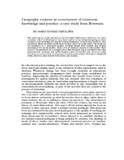| dc.contributor.author | Tabulawa, R.T. | |
| dc.date.accessioned | 2010-06-16T13:30:20Z | |
| dc.date.available | 2010-06-16T13:30:20Z | |
| dc.date.issued | 2004-01 | |
| dc.identifier.citation | Tabulawa, R. T. (2004) Geography students as constructors of classroom knowledge and practice: a case study from Botswana, Journal of Curriculum Studies, Vol. 36, No.1, pp. 53-73 | en_US |
| dc.identifier.issn | 0022–0272 | |
| dc.identifier.uri | http://hdl.handle.net/10311/516 | |
| dc.description.abstract | This study reports on the strategies (overt and subtle) employed by students in one senior secondary school in Botswana to keep their teachers in an information-giving position. Contrary to the prevailing view that the 'teacher dominance' of classroom activities so often reported in classroom studies results from teachers' desire for social control, this study sees the dominance as a negotiated product, resulting instead from teachers and students exercising power on one another. Such a view of classroom practice is only possible where power is conceptualized not as a negative force that dominates, but as a productive force that simultaneously constrains and enables human action. Viewed this way, classroom reality becomes a co-construction, a 'joint project' by teacher and students. Attempts to change this reality, therefore, must include both teacher and students. | en_US |
| dc.language.iso | en | en_US |
| dc.publisher | Routledge. http://www.informaworld.com | en_US |
| dc.subject | Geography | en_US |
| dc.subject | Education | en_US |
| dc.subject | Curriculum studies | en_US |
| dc.subject | Botswana | en_US |
| dc.title | Geography students as constructors of classroom knowledge and practice: a case study from Botswana | en_US |
| dc.type | Published Article | en_US |

